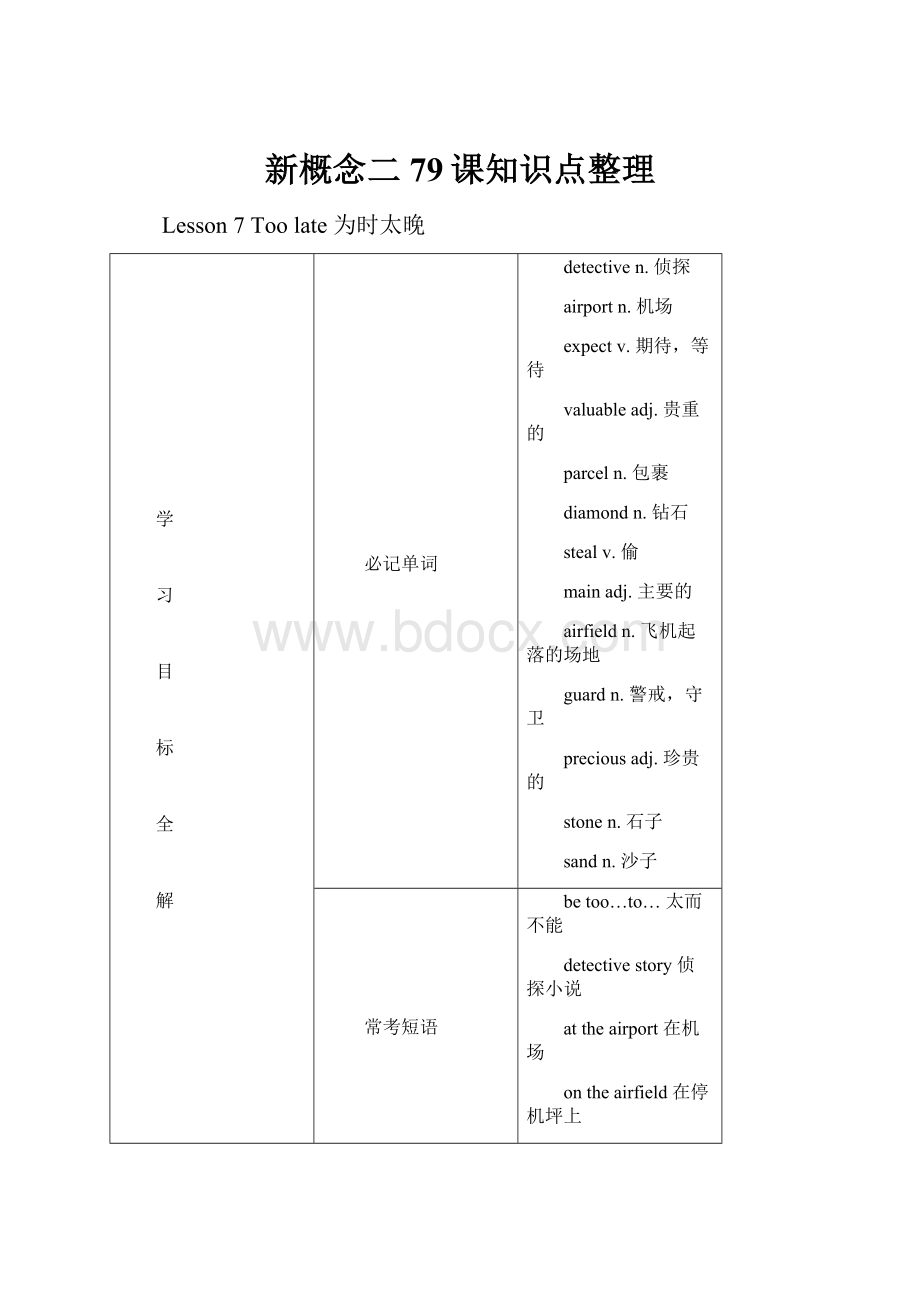新概念二79课知识点整理.docx
《新概念二79课知识点整理.docx》由会员分享,可在线阅读,更多相关《新概念二79课知识点整理.docx(37页珍藏版)》请在冰豆网上搜索。

新概念二79课知识点整理
Lesson7Toolate为时太晚
学
习
目
标
全
解
必记单词
detectiven.侦探
airportn.机场
expectv.期待,等待
valuableadj.贵重的
parceln.包裹
diamondn.钻石
stealv.偷
mainadj.主要的
airfieldn.飞机起落的场地
guardn.警戒,守卫
preciousadj.珍贵的
stonen.石子
sandn.沙子
常考短语
betoo…to…太而不能
detectivestory侦探小说
attheairport在机场
ontheairfield在停机坪上
Ithinkso.我认为是这样。
Iexpectso.我希望如此[口语]
expectsb.todosth.期待某人做某事
waitforsth./sb.动作上的等待
keepguard守望,警戒=standguard
totheirsurprise使他们吃惊的是
befullof充满=befilledwith
经典句型
1.TheywereexpectingavaluableparcelofdiamondsfromSouthAfrica.
2.Thieveswouldtrytostealthediamonds.
3.TwomentooktheparcelofftheplaneandcarrieditintotheCustomsHouse.
4.Totheirsurprise,thepreciousparcelwasfullofstonesandsand!
重点语法
过去进行时
过去进行时的构成:
be的过去式+现在分词
过去进行时和一般过去时经常同在一个句子里使用。
过去进行时表示过去正在进行的动作或情况,一般过去时则表示比较短暂的动作或事件。
正在进行中的动作或情况往往由连词when,while,as,justas
等引导。
when,while当……时候(强调动作同时发生)
while+从句,动词一定是延续性动词
when+延续性动词/瞬间动词
while能用when代替______,但是when却不一定能用while代替。
while通常只引导持续时间较长的动作,
并且主句和从句可以同时用过去进行时,而when和as一般不这么用。
JohnwaswatchingTVwhilehiswifewastalkingwithaneighbouroverthephone.
JustasIwasleavingthehouse,youcamein.
when也可以引导比较短暂的动作,while和as则一般不行。
Wewerehavingsupperwhenthelightswentout.
过去进行时往往与表示一段时间的状语连用,如allmorning,allnight,allday,allevening,thewhole
week等,表示这段时间一直在干什么。
Whatwereyoudoingallevening?
Icouldn’tfindyouanywhere.
过去动作同时发生的时态
①过去两个动作同时发生,习惯上一个用一般过去时,另一个用过去进行时;动作长用过去进行时,
动作短用一般过去时;分工的情况,动作的开始时间和结束时间几乎相同,均用过去进行时;
Iwaslisteningtotheradio,mysisterwasdancing.
Whenmymotherwasdoingthehousework,myfatherwaswatchingTV.
②两个动作在同时段进行,在不同时间结束,先发生的动作未结束,另一个动作发生,先发生的动作
用进行时态,另一个动作用过去时.
WhenIwasopeningthedoor,thetelephonerang.先开门
Whenthetelephonewasringing,Iopenedthedoor.电话先响
③瞬间动词(如:
arrive)没有进行时态,所以两个动作同时发生,延续性动词用进行时态,瞬间动词
使用过去时态.
Whenhearrived,Iwashavingdinner.
Iamarriving进行时态表示将要
教材全解
1、Theplanewaslateanddetectiveswerewaitingattheairportallmorning.飞机误点了,侦探们在机场等了整整一上午。
all一般直接加表示时间的单数名词构成副词短语,如:
allday,allnight,allweek,allwinter,allyear
等。
但不说allhour。
whole在表达同样的意思时一般要加冠词或数词,如awholeday/year,twowholeweeks。
allmorning=allthemorning
Theplanewaslate飞机晚(点)了
Thebuswaslate./Thetrainwaslate.
detectives没有强调一些侦探或者那些侦探,强调侦探这种人,笼统概念,可不加some,the。
2、TheywereexpectingavaluableparcelofdiamondsfromSouthAfrica.他们正期待从南非来的一个装着钻石的贵重包裹。
expectv.期待,等待
①vt.&vi.预计,预料
Jimhasfailedinmathematicsashisteacherexpected.
正如他老师所预料的那样,吉姆数学考试没及格。
②vt.等待,期待,盼望(心理上的等待)
Theyareexpectinggueststonight.今晚有人要去他们那里作客。
expect所表示的等待一般暗含着根据某些信息或规律而作出相应反应的意思,而waitfor主要接续“等
待”这个动作本身。
expectsth.
IexpectaletterfromJimmy.
expectsb.todosth.期待某人做某事
Iexpectyoutowriteback.
Iexpectmymothertocomeback.
waitforsth./sb.动作上的等待
Iwaitformymother.
③vt.认为,猜想(一般用于口语)
Iexpectso./Ithinkso.我希望如此[口语]
Iexpectyou’veheardthenews.我想你已经听到这个消息了
avaluableparcelofdiamonds
valuableadj.贵重的&preciousadj.珍贵的
valuen.&v.价值;valuableadj.有价值的
sth.isvaluable/sth.isprecious
preciousadj.珍贵的(带有一定的感情色彩)
preciousphoto珍贵的照片
拓展:
-less表否定;
pricelessadj.没有价格的,无价的
valuelessadj.没有价值,不足道的
worthlessadj.无价值的
3、Afewhoursearlier,someonehadtoldthepolicethatthieveswouldtrytostealthediamonds.数小时前,有人向警方报告,说有人企图偷走这些钻石。
afewhoursearlier几个小时以前
=afewhoursbefore/afewhoursago
would+do过去将来时,间接方式,转述,站在过去看未来
steal(stole,stolen)v.偷&robsb.抢(某人)
①vt.&vi.偷盗,行窃
英语中“偷”用steal和rob来表达,宾语是物,用steal;宾语是人,用rob;跟地点相连,也用rob
stealsth.偷(某物)
Mywalletwasstolen.
Johnneversteals.约翰从不偷东西。
拓展:
robsb.抢(某人)
Iwasrobbed.
robthebank
②vt.巧妙地占用,偷偷地弄到手
HehasstolenawayMary’sheart.他已赢得玛丽的芳心。
③vi.偷偷地行动,悄悄靠近
Hestoleintotheroom.他悄悄地进了房间
4、Whentheplanearrived,someofthedetectiveswerewaitinginsidethemainbuildingwhileotherswerewaitingontheairfield.当飞机到达时,一些侦探等候在主楼内,另一些侦探则守候在停机坪上。
代词others常常和some连用,表示“有些(人)……,也有些(人)……”或“有的……,其余的……”
one…theother…一个……另一个……
some…others…一些……另一些……
Somestudentsareveryhard-working,othersarenot.
others=other+名词复数
5、TwomentooktheparcelofftheplaneandcarrieditintotheCustomsHouse.两个人把包裹拿下飞机,进了海关。
takesth.off…=takesth.awayfrom…
andcarrieditinto…carried表示看着很重
CustomsHouse海关
6、Whiletwodetectiveswerekeepingguardatthedoor,twoothersopenedtheparcel.当两个侦探把住门口时,另外两个侦探打开了包裹。
表面上是分工,两个动作同时发生,不是同时开始同时结束,延续时间不一致,长一点时间的动作用进
行时态,短时间的动作用过去时.
Whensomeoneknockedatthedoor,Iwashavingdinner.
keepguard守卫
Theykeptacloseguardoverthethieves.
atthedoor在门边(固定搭配)
twoothers=twootherdetectives
7、Totheirsurprise,thepreciousparcelwasfullofstonesandsand!
toone'ssurprise,让某人惊讶的是,那珍贵的包裹里面装的全是石头和沙子。
Tomysurprise,theteacherwaslate.
Toone’s+表达人情绪的名词
toone'sjoy
Tomyjoy,mymothercamehereyesterday.
toone'sexcitement
Toourexcitement,ourteamwins.
befullof...装满
Mybagwasfullofbooks.
Thecupisfullofwater.
Lesson8Thebestandtheworst最好的和最坏的
学
习
目
标
全
解
必记单词
competitionn.比赛,竞赛
neatadj.整齐的,整洁的
pathn.小路,小径
woodenadj.木头的
pooln.水池
常考短语
keep.......neat保持........整洁
everytime每次
workhard努力工作
growflowers种花
makeapath修路
awoodenbridge一座木桥
enterfor报名参加(各种竞赛,考试等活动)
winaprize赢得奖励
经典句型
1.JoeSandershasthemostbeautifulgardeninourtown.
2.BillFrith’sgardenislargerthanJoe’s.
3.BillworksharderthanJoeandgrowsmoreflowersandvegetables,butJoe’sgardenismoreinteresting.
4.EveryyearIenterforthegardencompetitiontoo,andIalwayswinalittleprizefortheworstgardeninthetown.
重点语法
形容词和副词的比较级和最高级
1.比较级、最高级的构成
(1)一般情况下,比较级在后面加-er,最高级在后面加-est
eg.small→smaller→smallestshort→shorter→shortest
(2)在重读闭音节(即:
辅音+元音+辅音)中,先双写末尾的辅音字母,比较级加-er,最高级加-est
eg.big→bigger→biggesthot→hotter→hottest
(3)以不发音e结尾的单音节词,比较在原级后加-r,最高级在原级后加-st
eg.large→larger→largestnice→nicer→nicest
(4)以“辅音字母+y”结尾的双音节词,把y改为i,比较级加-er,最高级加-est
eg.easy→easier→easiestheavy→heavier→heaviest
(5)多数多音节词,比较级在前面加more,最高级在前面加most
eg.beautiful→morebeautiful→mostbeautiful
different→moredifferent→mostdifferent
(6)有少数形容词、副词的比较级和最高级是不规则的,必须熟记
eg.good→better→bestbad→worse→worse
old→elder→eldestmany/much→more→most
little→less→leastfar→further/farther→furthest/farthest
2.形容词、副词比较级的用法
表示两者间的比较用比较级。
其常见句式有:
(1)A+be+形容词比较级+than+B意思是A比B更……
eg.Thistreeistallerthanthatone.
这棵树比那棵树高。
(2)become+形容词比较级+and+形容词比较级意思是变得越来越……,and连接同一个形容词的比较级。
eg.Itbecomeswarmerandwarmerwhenspringcomes.
春天来了,天气变得越来越暖和了。
(3)在含有or的选择疑问句中,如果有两者供选择,前面的形容词要用比较级形式。
eg.Whoistaller,TimorTom?
谁更高,Tim还是Tom?
3.形容词、副词的最高级的用法
形容词、副词的最高级形式主要用来表示三者或三者以上人或事物的比较,表示“最……”的意思。
句子中有表示范围的词或短语。
如:
ofthethree,inourclass,among等等。
eg.Heisthetallestinourclass.
他在我们班里是最高的。
Sheistheprettiestoneofthesixgirls.
六个女孩中,她最漂亮。
LiuXiangisthebesthurdlerinourcountry.
刘翔是我国最好的跨栏选手。
不定代词
1.both&all的用法
(1)both意为“两者都”,指两个人或物,句中谓语动词用复数,常和and连接。
eg.BothsheandIarestudents.
她和我都是学生。
Bothplansaregood.
这两个计划都不错。
(2)all指三者或者三者以上都
eg.Allofusshouldgothere.
我们所有人都应该去那里。
Theyallagreetostayhere.
他们都同意待在这儿。
2.each&every的用法
(1)each表示“每一个”之意,用来指两个或两个以上的人或事物,强调个体。
可作名词或形容词,在句中充当主语,定语,宾语等。
直接作主语时,谓语动词用第三人称单数。
eg.Therearetreesoneachsideoftheroad.
这条街的每一边都有树。
EachofuswearsayellowT-shirt.
我们每个人都穿着一件黄色T恤。
(2)every表示“每一个”之意,指三个或三个以上的人或事,强调整体,在句中只能作定语,修饰名词时谓语动词也用第三人称单数形式。
eg.Everystudentpassedtheexam.
每个学生都通过了这次考试。
Each&Every共同特点:
二者都只能修饰单数可数名词,句中谓语动词要用单数。
3.either&neither的用法
(1)either指两个人或物中的任何一个,表示肯定含义。
eg.Therearemanytreesoneithersideofthestreet.
这条街每边都有树。
EitheryouorIamgoingtoAmericanextweek.
下周要么你去美国,要么我去。
(2)neither指两个人或物中一个也不,表示否定含义。
eg.Neitherofthebooksisgood.
这两本书中没一本是好的。
NeitherhenorIamstudent.
他不是学生,我也不是。
Either&Neither共同特点:
都可作主语,宾语,定语,作主语时,谓语动词用单数。
、
教材全解
1.Nearlyeverybodyentersfor‘TheNicestGardenCompetition’eachyear,butJoewinseverytime.几乎每个人都参加每年举办的“最佳花园竞赛”,而每次都是乔获胜。
nearly&almostadv.
nearly和almost意义相似,表示“几乎”、“差不多”、“差点儿”的意思。
在肯定句中可以相互替换,与否定词连用时通常用almost。
eg.Ihavenearly/almostforgottenhisname.
我几乎记不起来他的名字了。
Henearly/almostfellintotheriver.
他差点儿掉进河里。
Almostnoonebelievedher.
几乎没有人相信她。
enter&enterforv.
enter+地点:
进入,走进
eg.Youalwaysknockonthedoorbeforeyouenter.
你总是会在进入之前敲门。
Astrangerenteredthebuildingtenminutesago.
一个陌生人十分钟前进入了大楼。
enterforsth:
报名参加(活动,比赛),强调报名
eg.Maryenteredforthetest.
玛丽报名参加考试。
Sheenteredforthemathematicscompetition.
她报名参加数学竞赛
拓展:
join/joinin参加(加入)attend出席,参加(主动去)
takepartin真正的参加,加入
competitionn.
competev.
辨析:
competition,contest,match,race,game
(1)competition比赛,竞争(正式)
eg.chesscompetition棋类比赛
commercialcompetition商业竞争
(2)contest比赛(赛场上的较量)
eg.beautycontest选美
folksongcontest民歌比赛
babycontest宝宝大赛
(3)match比赛(球类)
eg.tennismatch网球赛footballmatch足球比赛
(4)race比赛(速度)
eg.horserace赛马Marathonrace马拉松赛跑
carrace赛车
(5)game比赛(广义上),游戏
eg.theOlympicGames奥林匹克运动会
computergames电脑游戏
winv.(won,won)
(1)vi.赢
eg.Iwin./Ilose.(输了)
(2)vt.赢得win+sth(后面往往是奖品,不能接对手)
eg.Ihavewonabook.我赢得了一本书。
Iwintherace/game我赢了比赛。
winaprize赢了奖winaprizefor…因为……而获奖
eg.Mybrotherwonapairofshoesforthisrace.
我弟弟参加赛跑,得到了一双鞋作为奖励。
拓展:
beatsb或defeatsb:
赢了某人、打败某人
eg.Theyweredefeatedinthebasketballmatch.
他们在篮球比赛中输了。
Idefeatyou.
我打败了你。
2.BillworksharderthanJoeandgrowsmoreflowersandvegetables,butJoe’sgardenismoreinteresti